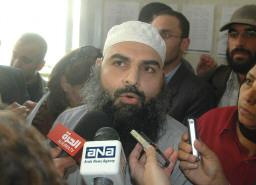A date was set Wednesday for Italy's top court to OK or block a landmark Italian trial into one of the United States' most controversial anti-terrorism practices.
The Constitutional Court will meet on July 8 to consider two opposing arguments about the suspended trial of American and Italian spies for the 2003 'rendition' of Muslim cleric Hassan Mustafa Omar Nasr, also known as Abu Omar.
The Italian government contends that Milan prosecutors overstepped their Constitutional bounds, needlessly exposing agents and straining US-Italian security ties.
The prosecutors reject the argument, saying they were acting within Italian law.
Furthermore, they have asked the top court to force the government to release information on the kidnapping which the government has withheld, citing official-secrecy regulations.
On Wednesday it was also decided that the Constitutional Court hearing will be held behind closed doors, as requested by the government.
The top court was slated to examine the arguments at the end of January but postponed the hearing after the two sides said they would try to reach ''a mutually agreed resolution of the conflict''.
Talks are now proceeding on the basis of prosecutors' willingness to substitute a highly sensitive document with another one containing basically the same information but with the most confidential parts blacked out.
Both side hope to reach a deal to allow the trial to continue before the July deadline.
Another factor hanging over the trial's fate is which government will emerge from April 13-14 elections.
However, the last government led by centre-left Premier Romano Prodi followed essentially the same line as its predecessor headed by centre-right leader and current election favourite Silvio Berlusconi - in power when the cleric was snatched.
In fact it was the Prodi government, not Berlusconi's, which put the matter to the Constitutional Court. The trial - the keenly awaited first judicial examination of rendition - opened in June but was adjourned two weeks later pending the Constitutional Court ruling.
Despite Prodi's taking the same tack as Berlusconi, the case has caused tensions between Italy and the United States.
This was not helped by the fact that the trial opened just hours before US President George W. Bush paid an official visit to Rome.
The 26 CIA agents, including ex-Rome chief Robert Seldon Lady and ex-Milan chief Jeff Castelli, were put on trial in absentia.
The former commander and deputy commander of Italian military intelligence agency SISMI, Niccolo' Pollari and Marco Mancini, are also on trial along with five SISMI agents.
NASR CASE 'PERFECT EXAMPLE OF RENDITION'.
Nasr, the former head of Milan's main mosque, disappeared from the northern city on February 17, 2003.
Prosecutors say he was snatched by a team of CIA operatives with SISMI's help and taken via Germany to Egypt to be interrogated.
Nasr, who was under investigation in Italy on suspicion of helping terrorists, was released early last year from an Egyptian jail where he says he was tortured and threatened with rape.
He has demanded millions of euros in compensation from the Italian government.
The prosecution has called more than 100 witnesses including Berlusconi and Prodi.
It also called Dick Marty, head of a Council of Europe (CE) probe which concluded that 100 persons had been kidnapped by the CIA in Europe and rendered to a country where they might be tortured.
Marty has described Nasr's abduction as a ''perfect example of extraordinary rendition''.
The report from Europe's top human rights body claims the US forged a secret deal with NATO in October 2001 to permit the CIA flights and also supply aid to countries threatened by terrorism.
The CE claims the CIA ran secret prisons in Poland and Romania from 2002 to 2005 with the knowledge of the two countries' presidents.
Last year the European Parliament (EP) rapped three countries including Italy for allowing the US to fly terror suspects to foreign locations where they are believed to have been tortured.
The Italian rapporteur in that EP inquiry, MEP Claudio Fava, has also been asked to testify in Milan.
Prosecutors in several other European countries are now probing CIA flights.
The US admits renditions but denies torture.
The US State Department described the EP report as ''unfair, inaccurate and distorted''.
The CIA was first granted permission to use rendition in a presidential directive signed by President Bill Clinton in 1995 and the practice grew sharply after the September 11 terrorist attacks.
The US recently said it had suspended its rendition programme.













